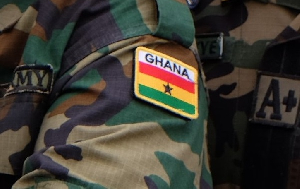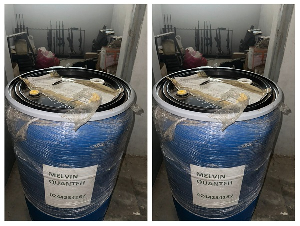Accra, Oct 9, GNA - Mr. James Myers, one of Former President Nkrumah's body guards on Thursday told members of the National Reconciliation Commission (NRC) that during the 1966 coup d'etat he and about 24 other body guards and protection officers were tortured by soldiers who seized all their belongings.
He said he was detained at the Nsawam Prisons from February 25 1966 to December 7, 1967 before he was released, adding that no compensation was paid him.
Mr. Myers said he was working as an Accountant with the Ghana Publishers Association when he was detailed for training to take up the position as a bodyguard of President Nkrumah, adding that being a party activist, he was happy to take up the post.
He said on the day of the coup he was in-charge of the bodyguards on duty when one Colonel Zanlerugu informed them that some people were going to attack the Flagstaff House.
The witness, who said President Nkrumah had travelled outside Accra, noted that not long after the message they heard gunshots. He said Kotoka and Afrifa then came into the yard and arrested Fathia Nkrumah, while the soldiers that came with them arrested him and the 24 other guards.
Mr. Myers said they took Fathia to a different place, while he and his colleagues were taken to the Burma Camp, where their wrist watches, monies and shoes were seized.
He said after they were fed with a container of rice and fish, the soldiers asked them to remove their dresses and lie on the gravel till the next morning.
Mr. Myers said they were taken to the Police Headquarters where they were asked to lie supine in the sun, adding that when he asked for water, the soldier that guarded him to the tap cut his thigh with his bayonet.
He said he bled profusely on their way to the Nsawam Prisons and had to be rushed to hospital, adding that he fell unconscious on the way. The Witness said he returned home after serving his prison term to realize that his home had been ransacked by the soldiers, who stole his wife's gold ornaments, his furniture and suitcases.
He said his wife who had given birth six months earlier was driven out of their apartment with his four other children.
Mr. Edward Yaw Opoku Badu, another witness, who appeared before the Commission told members that Mr. Mustapha Gariba, then head of the Motor Traffic and Transport Unit (MTTU) had him arrested for wearing a British Union Jack flag in 1990.
According to the witness, Mr. Mustapha said he did not understand why he (Badu) should wear the union flag when Ghana had long since attained independence.
Mr. Badu, who is a signwriter said Mr. Mustapha and his men seized the Union Jack flag as well as about 1,200 dollars he had on him after which they released him.
He said most of the drivers that used the Union Jack flag on their vehicles stopped doing so because they were constantly harassed by Mr. Mustapha and his men.
Justice Amoa Sekyi, Chairman of the Commission noted that Mr. Mustapha had brought a written statement to the Commission denying any knowledge about Mr. Badu's evidence.
Witness sobbed at NRC
Accra, Oct 9, GNA - An octogenarian, Mr. Emmanuel Agyei Acheampong, on Thursday sobbed before the National Reconciliation Commission (NRC) public hearing in Accra, as he narrated the ordeal that befell him in the days after the December 31, 1982 Revolution.Not only has Mr Acheampong, the former briefcase and suitcase maker lost his business, but also his son, then a teenager, who brought the idea, which culminated into the flourishing business, was later trapped in a fire outbreak at the factory, and died at the Korle Bu Hospital. The witness explained that he registered the Company as Kwabena Bio's Enterprise in 1979, and supplied the suitcases and briefcases to private store operators and later to the departmental stores of the Ghana National Trading Corporation (GNTC), the UTC and Kingsway.
However, after the December 31 1981 revolution, Mr Acheampong said officers of the departmental store told him that Flt Lt Jerry Rawlings, then Chairman of the Provisional National Defence had ordered them to stop buying the suitcases from private people.
Mr Acheampong said he therefore, decided to sell his products to his former private clients.
Mr Acheampong said one day, he was surprised on his return to find that soldiers were selling at "government controlled price" the wares in the vehicle he parked at Okaishie when he went to inform his clients of a supply he had brought them.
Mr Acheampong said the soldiers threatened to kill him if he dared move after he had identified himself as the owner of the goods. The soldiers sold the suitcases and briefcases on the vehicle and bolted with the proceeds.
The witness said his son died through a fire outbreak at the factory, and life became very difficult for him thereafter, and he consequently sold one by one all his five industrial machines, and went out of business.
Life was so difficult that if his wife did not hawk with her sewing machine to make some money for the family he went on empty stomach. Mr Acheampong said in addition to the adverse effect the situation had on the education of his last four children, the trauma had made him an out-patient of the of the Pantang Mental Hospital, where he undergoes monthly reviews.
He expressed his gratefulness to the government for establishing the Commission to give audience to victims of human rights abuses. Commissioner Uborr Dalafu Labal suggested to Mr Acheampong to let his children come together for the possibility of reviving the business.
Mr Lord Kwesi Sey, another witness now resident in Accra, prayed the Commission for the return of a rented house unit, House No. V 30, at Tema Community Seven, he acquired from the Tema Development Corporation (TDC), which he said, had been illegally transferred to one Madam Mbeah without his consent.
He said after a number of ejections, which he challenged, and won, the TDC finally succeeded in ejecting him in 1995 and gave it to the woman.
Mr Sey said he was also wrongly incarcerated intermittently for three years at the Gondar Barracks, James Fort and the Ministries Police Station on false charges linked to transfer of the house, and a cocoa deal in which, he said, he was falsely accused of swindling 260,000 dollars.
He prayed for the return of his house, and asked that he must also be compensated for living in hotels for more than three years.
Madam Sarah Aikins, another Witness, said she and a fellow baker were approached in 1983 by Ex Warrant Officer Adjei Boadi, who she described as Co-ordinator the Forces Wives Association at the Burma Camp and two women, Nana Frema, President, and one Aisha Asiedu, Secretary.
She said the Forces Wives Association was the name given to the 31 December Women's Movement, and the three invited them to bake bread to be given to the Supply Depot to be distributed to the Burma Camp community.
Madam Aikins said she and her friend bought flour machines for the bakery, but the December 31 Women's Movement would not let them have their machines when they (the two women) decided to stay out of the business when they discovered that the flour being used was of low quality.
She said although a public tribunal had ruled in their favour for the release of the machines, the Movement still did not budge, and prayed the Commission to let them have their machines.
Sub-Editor was dismissed without cause
Accra, Oct. 9, GNA - A former Chief Sub-Editor of the Ghana News Agency (GNA), Mr. Jerry Kartey Tetteh on Thursday told the National Reconciliation Commission that he was forced to retire from the GNA 12 years before his actual retirement following his arrest and detention in 1977.Now a Freelance Journalist, Mr. Tetteh said he was much aggrieved for being detained for five months by the then Special Branch now Bureau of National Investigation without trial in 1976.
He added that no reasons were assigned for his arrest and subsequent detention at the Nsawam Security Prisons.
He said though he collected his Social Security contribution, his salary was frozen from January 1977 and that his employers did not explain to him why he was retired but a friend told him that an Executive Instrument had been issued in the Gazette to stop his salary.
The Witness said he did not also benefit from a scheme established by the GNA for its workers, adding that the then General Manager, the Late K.B. Brown, could not explain why the Agency refused him his share.
Mr. Tetteh said after two men from the Military Intelligence arrested him on November 27 1976 from his Tema residence, he was taken straight to the Special Branch in Tema and then to Accra for interrogation on his trip to Japan in March the same year.
He said his Japan trip was based on an invitation letter from the Japanese Embassy based on which the GNA selected him to attend. ''Apart from this and some questions concerning my wife, children and sisters, no reasons were assigned for my detention.''
Mr. Tetteh said upon his release, he was asked by the Prison Officers to report at the Police Headquarters where he was asked to sign a statement titled "You are a known criminal," adding that he could not remember whether he signed it or not.
He said he gained his freedom but was not allowed to continue his work with the GNA.
Mr. Tetteh said he stringed for some media houses, including the












